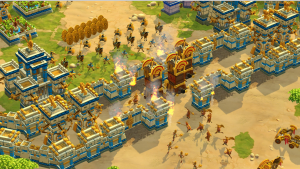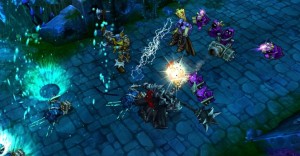This past week we have seen two very different games and the impact that Free to play design had on them. Age of Empires Online announced that while the game will still remain up, there will be no more new content coming as Microsoft has stopped funding it.
While with the title: The Secret World, they have reported considerable increase in sales and activity in the game after switching from a subscription service to free to play. Thereby, making The Secret World, one of the many MMOs that have bounced back after becoming F2P. Looking at both games we can talk about how F2P design has had an impact.
Age of Empires Online:
Age of Empires Online from day one was designed around being a F2P title. In order to fully made use of your civilization, you had to spend the money unlocking them. This in turn allowed you to equip better gear to your units and construct more structures and such in your home town.
Besides that, players could spend money on buying cosmetic items and quest packs that added in more content to do. The problem with Age of Empires Online model was that it was stuck between providing content and making money.
For anyone interested in competitive multiplayer, the only item they needed to buy was a premium civilization. Everything else was just more content tilted towards PvE play.
While the experiment of having a F2P RTS game was interesting, the design of a RTS clashes with one of the main components of F2P: continual updates. In a game like League of Legends, the designers continually updated the game with new champions and ever so often, major changes to the meta-game.
The problem was that with a RTS, there is a lot more work in terms of how new content works. New vanity items weren’t just designed for one character like in LoL, but for every unit, requiring more time on development. The AoEO developers couldn’t release new units every week as that would just destroy the balance of the game.

Age of Empires Online, while built from the start as free to play, struggled to provide constant content that fans expect from free to play games.
Compounding that last point, since each civ uses different units, if they did create a unit for one civ, they would have to make a comparable one for the other civs.
And creating a completely new civ was impossible to do in a week, due to the time needed for balancing, art design and general creation and there have only been a few civs added since launch.
While AoEO was an example of how F2P design can lead to problems, let’s look at why The Secret World is doing better because of it.
The Secret World:
When The Secret World was released last year, it received favorable reviews. The game’s modern setting and different character progression system was viewed as a positive.
But the game lacked the overwhelming amount of content compared to the 800 pound gorilla of World of Warcraft. Technical issues and the fact that the game was using micro transactions on top of a subscription model kept people away.
“In my opinion, I think that World of Warcraft is keeping the subscription model on life support.”
A general comment from gamers was: “I’ll wait until it goes F2P” as the subscription model has had major problems these days. Knights of the Old Republic dropped its model and Guild Wars 2 avoided all the hassle by not even being released with a subscription.
There are several reasons why The Secret World is showing success from a F2P model. First is that it’s harder to convince people to pay a monthly fee on a new type of design that also has micro transactions. Gamers expect a higher premium on subscription based MMOs these days thanks to the rise of F2P games.
That premium usually comes in the form of new content on a monthly basis, and simply put: There hasn’t been a MMO yet that could deliver on that promise. DC Universe Online tried it and quickly fell behind, which was one of the reasons why they went F2P as the game was quickly running out of content.
The simple matter is that for most casual to moderate gamers, they prefer to have control over what they spend on a game. And for them, spending money on individual items or content packs, would still be cheaper overall compared to a $15 a month subscription fee.
Looking At the Future:
With all that said: what does this mean for both titles and F2P design? While I liked AOEO, the announcement of no new content is most often the nail in the coffin for a F2P game.
These games thrive on new things to do and without it, outside of the hardcore fan base, most people won’t stick around. And not having any additional content will keep new players from trying it as they don’t want to play a “dead game.”

League of Legends extensive meta game and continued support has made it one of the most successful free to play titles.
As for The Secret World, I’ve been saying for at least a year now that subscription model MMOs is a thing of the past.
With the number of F2P games out there, a subscription model simply can’t compete with F2P games putting out the same or more content per month.
And if a developer wants to create an online game with production values, then the Guild Wars option of releasing it for a retail price with micro transactions can work.
In my opinion, I think that World of Warcraft is keeping the subscription model on life support. And that it is only a matter of time before they will drop it completely and that will be the end of it.
The ramifications of dropping the subscription model are up in the air at the moment. Personally I don’t think that it will signal the end of big budget online games, as we have seen just how much money games like League of Legends or Lord of the Rings Online have made under the F2P model.
With The Secret World, I thought it was a big mistake with releasing a retail, subscription model MMO, with micro transactions. And it just made the developers looks greedy, which I bet was a common opinion shared by critics of the game. Now that the game is free to play, I’m hoping that it will take off as I hate to see developers who try something new, fail to make an impact.
As we move into the new year, the next generation of MMO design will be coming soon, and we’ll also see where F2P design will grow.



Pingback: Perceptive Podcast: Free To Shoot | Game Wisdom()
Pingback: xbox 360()